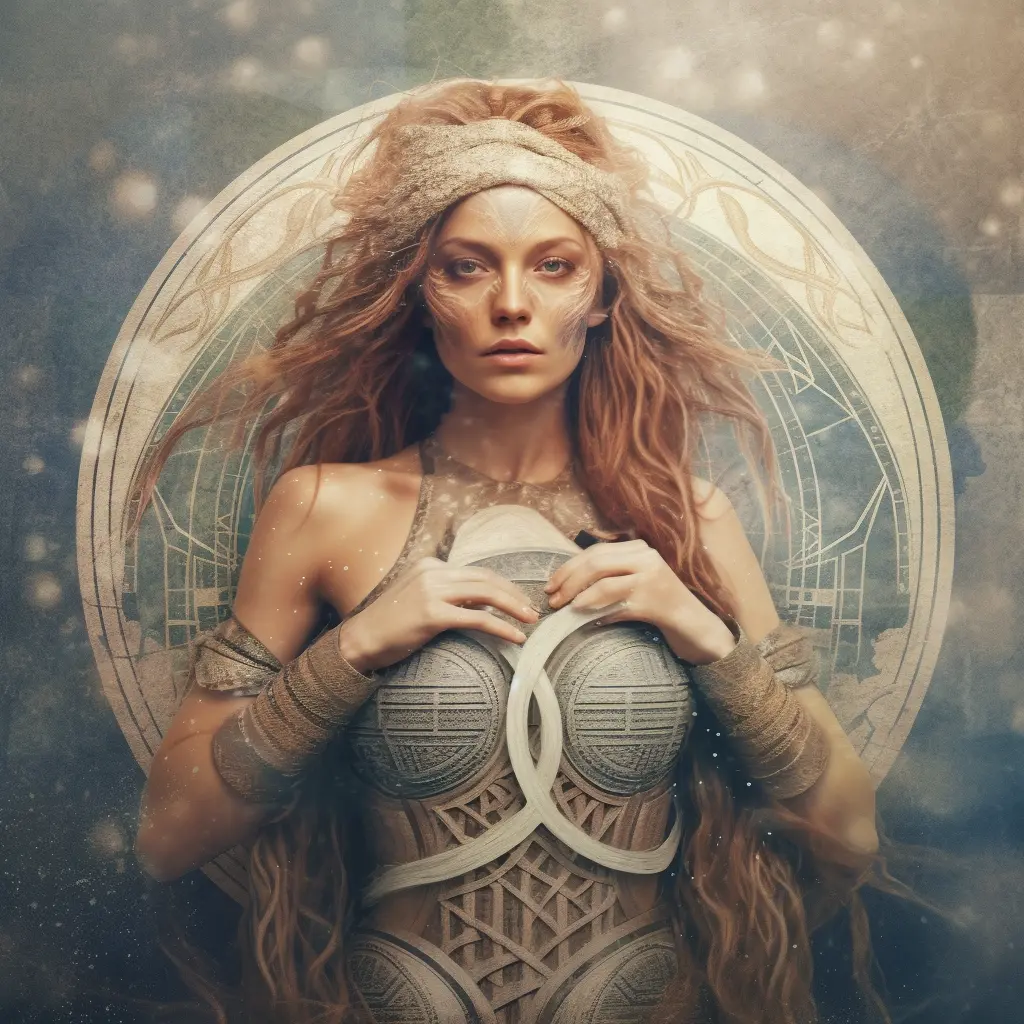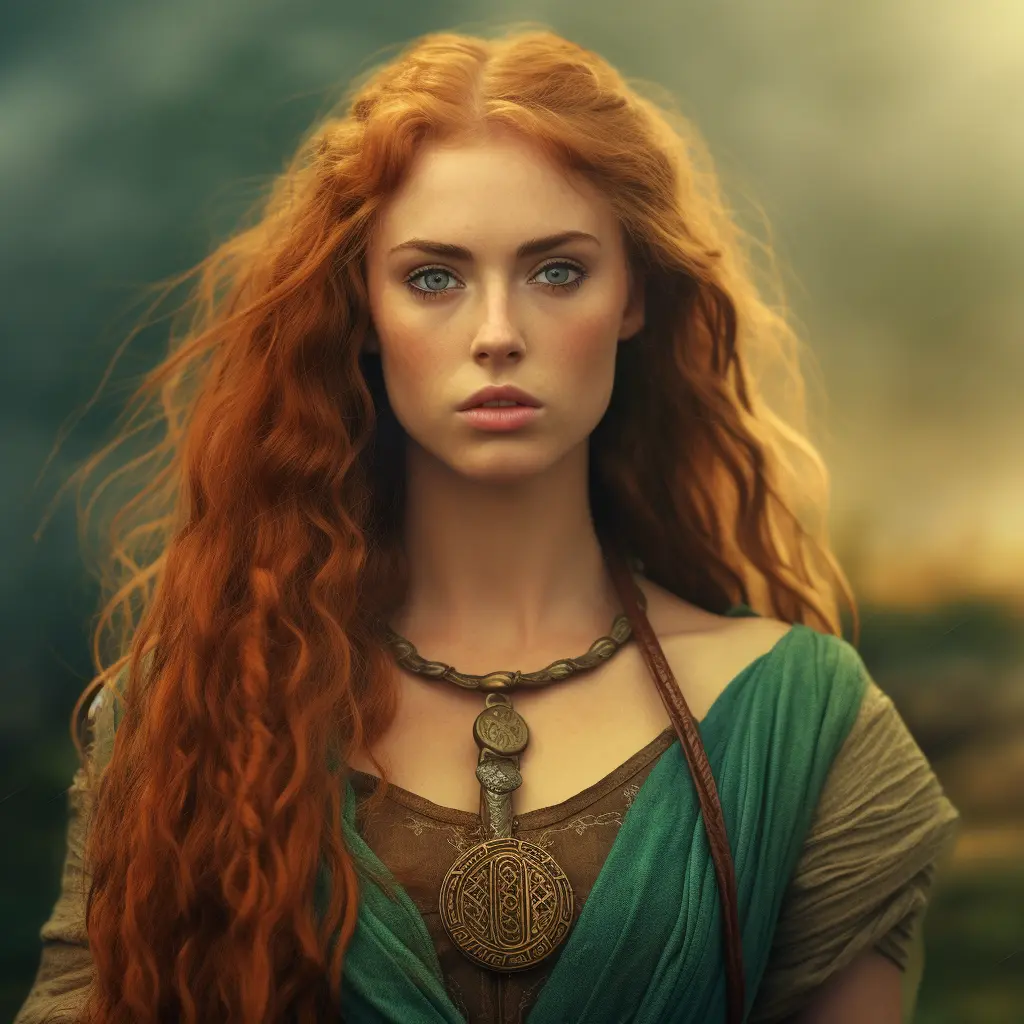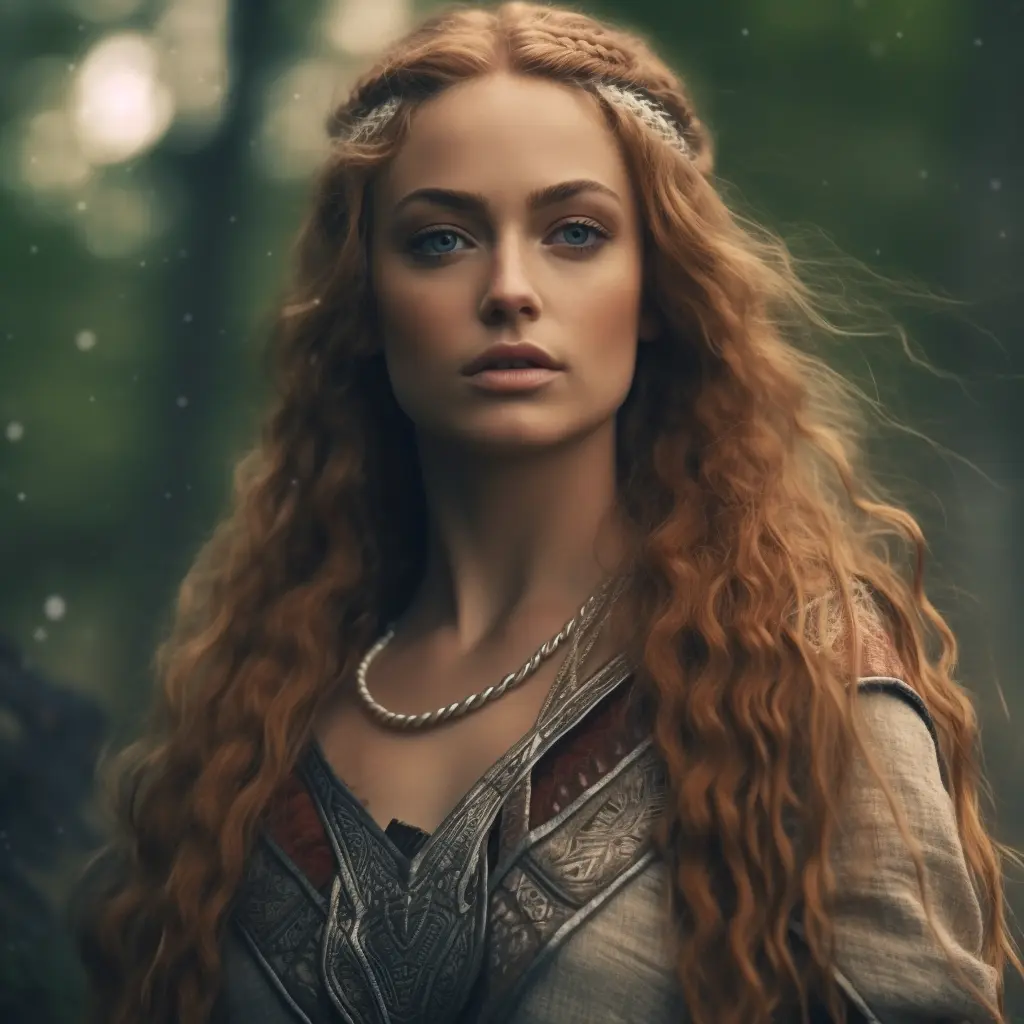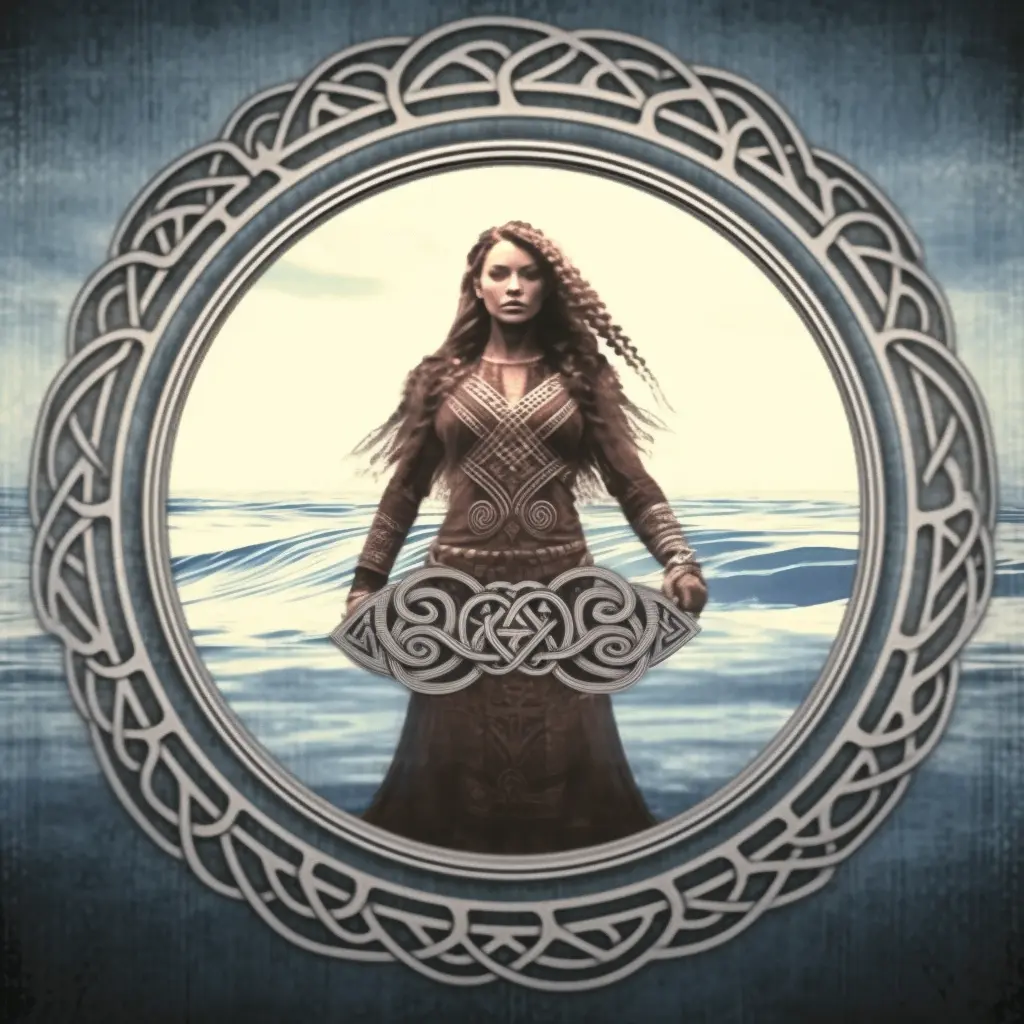Danu is a prominent figure in Celtic mythology, revered as the mother goddess and the female principle. Although much of the mythology surrounding her is contradictory and confusing, Danu is widely regarded as the earth-mother goddess who was honored under various names from eastern Europe to Ireland. She is also associated with water, as she is believed to have given rise to the gods of Ireland.
Danu Goddess mythology is shrouded in mystery, and there is little information about her in Irish texts. However, she is primarily known as the mother of the Tuatha Dé Danann, the Irish gods who were said to have descended from the sky and settled in Ireland. Danu is believed to have given birth to these gods, who were also known as the People of Danu.
Despite the lack of information about Danu, she remains a significant figure in Celtic mythology, and her influence can still be seen today in modern Pagan and Wiccan practices. In this article, we will explore the mythology surrounding Danu, her role in Celtic culture and religion, and how she is still celebrated by practitioners today.

Origins and Etymology of Danu Goddess
The Celtic goddess Danu is a significant figure in Irish mythology, known as the mother goddess of the Tuatha Dé Danann. Her origins and etymology are shrouded in mystery, with various theories proposed by scholars and linguists over the years.
One theory suggests that Danu is derived from the Proto-Celtic Duonū, meaning “aristocrat.” This theory is supported by linguist Eric Hamp, who rejects the traditional etymologies and proposes that Danu is related to the Latin word “bonus,” meaning “good.” This suggests that Danu was associated with nobility and power.
Another theory suggests that Danu is related to the goddess Anu, also known as Ana or Dana. Anu was a mother goddess in Irish mythology, associated with the land, fertility, and prosperity. Some scholars believe that Danu and Anu were originally separate deities who were later merged into a single figure.
The etymology of Anu is also uncertain, but it is believed to be related to the Proto-Celtic word *ano, meaning “mother” or “ancestor.” This suggests that both Danu and Anu were associated with motherhood and the ancestral line.
Danu in Celtic Mythology
Danu is a prominent figure in Celtic mythology, revered as the mother goddess who birthed all things into being. She is considered to be the oldest of all Celtic deities and is associated with earth, fertility, wisdom, wind, and the Celtic people.
According to the Lebor Gabála Érenn, a medieval Irish text, the Tuatha Dé Danann, also known as the People of the Goddess Danu, were a group of supernatural beings who invaded Ireland and defeated the Fir Bolg, the previous inhabitants of the land. The Tuatha Dé Danann were said to have descended from Danu, who was their divine ancestor.
Danu’s mythology is complex and often contradictory. She is sometimes associated with the land and is seen as an ancestral figure. In some Victorian sources, she is also associated with the otherworld, a supernatural realm that is believed to exist alongside the physical world.
In Welsh mythology, Danu is known as Don, and she is the mother of the Welsh god Bran the Blessed. In the Mabinogi, a collection of Welsh tales, Don is depicted as a powerful sorceress who is able to control the elements and shape-shift into various forms.
Despite the lack of information about Danu in Irish texts, her influence on Celtic mythology is significant. She is a symbol of the power of creation and the importance of the natural world. Her legacy can be seen in the reverence that many Celtic cultures have for the land and the environment.
Symbolism and Associations
Danu, the Celtic mother goddess, is a symbol of fertility, growth, abundance, and agricultural bounty. She is often associated with the earth, water, and wind, as well as wisdom and the moon.
The mythology surrounding Danu is contradictory and confused, but mother goddesses of earlier peoples were ultimately identified with her, as were many rivers and bodies of water. Her association with the land is evident in the fact that the gods of Ireland are called the Tuatha De Dannan, the People of Danu.
Danu is also associated with the moon, which was indicative of female properties across many cultures. She embodies female strength and power, and her nurturing spirit is reflected in the abundance of the land. Her connection to the universe is represented by her role as the mother of all gods, and her association with rebirth is seen in the cycles of nature.

Danu’s Role in Irish Mythology
Danu is a mysterious figure in Irish mythology, whose role is not clearly defined. She is often depicted as the mother goddess of the Tuatha De Danann, the gods of Ireland. The Tuatha De Danann were believed to have arrived in Ireland in ancient times, bringing with them the knowledge of magic and the arts. Danu was said to have given birth to the gods of Ireland, and was revered as the mother figure to the Celtic gods and goddesses.
Danu’s role in Irish mythology is complex and multifaceted. She is often associated with the land and the natural world, and was believed to have great power over the elements. She was also associated with fertility and the cycle of life, death, and rebirth.
In some myths, Danu is depicted as a warrior goddess, leading the Tuatha De Danann into battle against their enemies. She is sometimes identified with the goddess Morrigan, who was also associated with war and death.
Danu is also closely associated with the Paps of Anu, two hills in County Kerry that were believed to be the breasts of the goddess. The Paps of Anu were considered to be a source of fertility and abundance, and were associated with the goddess’s nurturing and life-giving qualities.
Danu as a Triple Goddess
In Celtic mythology, Danu is often associated with the Triple Goddess archetype, which represents the three stages of a woman’s life: maiden, mother, and crone. As a triple goddess, Danu is sometimes seen as the most central of the triple goddesses, as the tribe of the gods was named for her.
The maiden aspect of Danu represents youth, purity, and new beginnings. She is often depicted as a beautiful young woman, full of energy and vitality. The mother aspect of Danu represents fertility, nurturing, and protection. She is associated with the earth and is often depicted as a mother figure who provides nourishment and sustenance to her children. The crone aspect of Danu represents wisdom, transformation, and the end of life. She is associated with death and rebirth and is often depicted as an old woman who has lived a long and full life.
Danu’s triple goddess aspect can also be seen in the mythology of the Tuatha Dé Danann, the people of Danu. The Morrigan, a goddess often associated with war and fate, is sometimes depicted as a trinity of deities, consisting of the maiden Macha, the crone Babd, and the mother Danu.
Danu’s Influence on Celtic Culture
Danu, the Celtic mother goddess, played a significant role in the pre-Christian religion of Ireland and other Celtic regions. Her influence on Celtic culture can be seen in various aspects, including legends, Celtic deities, and Celtic tribes.
In Irish mythology, Danu was the mother of the Tuatha Dé Danann, the first wave of Celtic tribes to invade Ireland. She was also known as Ana, Danann, and Anann. The name Danu is believed to have been linked to water, and her name likely survives in many of Europe’s rivers, including the Danube and Don.
Danu’s influence can be seen in the legends surrounding her. She was known as the queen of the fertile land and the creator goddess of the Tuatha Dé Danann. Her power and influence over the world around them were revered by the Celtic people.
Danu’s influence can also be seen in the Celtic deities. Many goddesses of earlier peoples were ultimately identified with her, as were many goddesses of the Celts. She was seen as an ancestral figure, and some Victorian sources also associate her with the land.
In Welsh mythology, Danu was known as Don. She was the mother of Gwydion, Arianrhod, and Gilfaethwy, among others. Her influence can be seen in the Welsh pantheon of deities.
Danu’s influence on Celtic culture can still be felt today in the neopagan tradition. She is revered as a powerful and complex deity who has great influence over the world around us.

Danu’s Family and Relationships
While there is not much information about Danu’s personal life, her family and relationships are significant in understanding her role in Celtic mythology.
Danu is believed to be the mother of the Dagda, one of the most powerful gods in Irish mythology. The Dagda was known for his immense strength and his role as a protector of the people. He was also known for his magical powers, which he used to create abundance and prosperity for the land.
Danu is also associated with the Morrígan, the goddess of war and death. The Morrígan was often depicted as a crow or raven and was known for her prophetic abilities. She was often seen as a symbol of death and destruction, but she was also associated with fertility and rebirth.
According to the Celtic family tree, Danu is also believed to be related to Flidais, the goddess of the forest and wild animals. Flidais was known for her ability to control the animals of the forest and was often depicted as a hunter or a protector of the land.
Danu and the Natural World
Danu is often associated with the natural world. She is often associated with fertility, abundance, and wisdom.
One of the ways in which Danu is connected to the natural world is through her association with rivers. In fact, the name Danu is thought to be derived from the Proto-Indo-European word for “river.” Some scholars believe that Danu was originally a river goddess, and that her association with the Tuatha Dé Danann developed over time.
Danu is also sometimes associated with seagulls and fish. Seagulls are often seen as messengers of the gods in Celtic mythology, and they are sometimes associated with Danu’s wisdom. Fish, on the other hand, are associated with fertility and abundance, which are two of Danu’s key attributes.
Overall, Danu’s connection to the natural world is an important aspect of her mythology. Whether she is seen as an earth goddess, a river goddess, or a goddess of fertility and abundance, Danu’s presence in the natural world is felt in many different ways.
Worship and Reverence of Danu
Danu was highly revered in Celtic mythology and was worshipped as the mother goddess of the Tuatha Dé Danann, the supernatural race of beings in Irish mythology. She was associated with fertility, abundance, and wisdom, and was believed to be the mother of many of the gods of Ireland.
Worship of Danu often involved the creation of altars or shrines dedicated to her. These altars were often adorned with offerings such as flowers, herbs, and other items associated with nature. Danu was also believed to have connections to the fairies, sidhe, fae, and dolmens, and so these elements were often incorporated into her worship.
Danu was also believed to have a strong connection to the land, and so many offerings made to her were related to the fertility of the earth. She was often associated with the harvest, and so offerings of crops and other harvest-related items were common.

Danu’s Influence Beyond Celtic Lands
Danu’s influence extended beyond the Celtic lands. Indo-European language and Celtic studies have linked Danu to other goddesses, such as the Hindu goddess of the same name. This connection suggests that Danu may have been part of a pantheon of Indo-European deities that predated the arrival of the Celts in Europe.
The Scythian language, spoken by the nomadic Scythians who roamed the Eurasian Steppe, also had a goddess named Tabiti who was similar to Danu. Tabiti was the goddess of fire and the hearth, and her name may have been derived from the same root as Danu’s name.
In Welsh mythology, Dôn was the mother goddess of the Welsh gods. Like Danu, Dôn was associated with the land and fertility. Dôn was also linked to the stars and the heavens, and her name may have meant “the deep one” or “the abyss”.
Danu’s influence can also be seen in the Greek goddess Demeter, who was the goddess of agriculture, fertility, and the harvest. Demeter was associated with the earth and the changing of the seasons, much like Danu. Demeter was also a mother goddess, and her daughter Persephone was abducted by Hades, the god of the underworld, leading to the changing of the seasons.
Danu’s influence can be seen in goddesses from different cultures and regions, suggesting that she may have been part of a widespread pantheon of deities. Her association with the land, fertility, and motherhood made her an important figure in many ancient religions.
Modern Interpretations and Representations of Danu
Danu, the Celtic mother goddess, continues to be an important figure in modern neopagan traditions and practices. Her deep connections with fertility and abundance make her a popular choice for those seeking a nature-based spirituality.
In modern interpretations, Danu is often associated with the land and the natural world. She is seen as a protector of the earth and its creatures, and a source of nourishment and sustenance. Many neopagans also see her as a symbol of feminine power and strength.
Some modern representations of Danu depict her as a serene and nurturing figure, while others emphasize her wild and untamed nature. She is often depicted holding a cornucopia or a bowl of fruit, symbolizing her association with abundance and fertility.
In addition to her role as a mother goddess, Danu is also seen as a goddess of wisdom and knowledge. She is sometimes associated with the ancient druids, who were said to have been her priests and priestesses.
Danu’s enduring popularity in modern neopaganism is a testament to the power and significance of the mother goddess archetype. Her representation as a nurturing and protective figure, as well as a source of wisdom and abundance, continues to resonate with many people seeking a deeper connection with the natural world.

Frequently Asked Questions
What is the meaning of Danu in Irish mythology?
Danu is a mother goddess in Celtic religion and the female principle. She was honored under various names from eastern Europe to Ireland. The mythology that surrounded her was contradictory and confused. Mother goddesses of earlier peoples were ultimately identified with her, as were many goddesses of the Celts.
Who are some other Celtic goddesses?
Some other Celtic goddesses include Brigid, Morrigan, Epona, Rhiannon, and Macha.
What are some herbs associated with the Celtic goddess Danu?
Some herbs associated with the Celtic goddess Danu include lavender, rosemary, dandelion, and nettle.
What are the powers of the Celtic goddess Danu?
The powers of the Celtic goddess Danu are associated with motherhood, fertility, and the land. She is also associated with water and the creation of the gods that ruled over Ireland.
Is Danu considered a triple goddess?
It has been suggested that Danu was considered a triple goddess in Irish mythology.
What are some offerings that are commonly given to the Celtic goddess Danu?
Some offerings that are commonly given to the Celtic goddess Danu include flowers, herbs, and water. Other offerings may include food, wine, or other items that are associated with fertility and motherhood.
What is Danu the goddess of?
Danu is a mother goddess in Celtic mythology, often associated with the land, fertility, and water.
What does Danu mean in Irish?
In Gaelic-Irish, “Danu” is believed to mean “flowing” or “river,” linking her to waters, rivers, and fertility.
Are Danu and Brigid the same?
No, Danu and Brigid are not the same. While both are significant figures in Celtic mythology, Brigid is a goddess of fire, poetry, healing, and smithcraft, whereas Danu is primarily associated with the land, fertility, and water.
What are Danu goddess symbols?
Danu is often symbolized by rivers, flowing water, and sometimes by the moon, representing her connection to fertility, the land, and water. Due to this, she can be described as the Celtic goddess of nature.
Check out more below Danu in this video below:
https://www.youtube.com/watch?v=hgT8Nns8WSE

